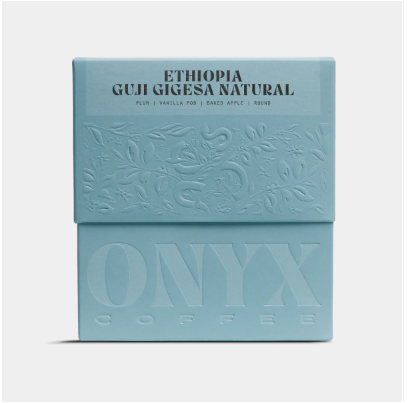
About this Coffee
This natural-processed micro-lot from Guji falls right within the intersection of comfort and modern. Defined by a complex tactile feel, this coffee processed by the Gigesa station is sure to be a crowd pleaser. This particular profile works exceedingly well as an espresso.
Vital, fascinating, vibrant. All these adjectives arise when the Guji region of Ethiopia is described. In terms of specialty coffee production, Guji is widely acclaimed to be at the top of quality when it comes to Ethiopian coffee. Thanks to the soaring elevation and the deep cultural practice of harvesting coffee, natural processed coffees from Guji excel in complexity while upholding the delicate notes found within great Ethiopian coffee. This particular natural comes to us by way of Testi Coffee. Founded in 2017, the station purchases cherry from over 500 small-holder producers. Processing both washed and natural, this station has produced stellar coffees for six years.
NATURALLY PROCESSED COFFEE
Natural coffees are beautiful… Okay, natural coffees are beautiful when done properly, but can be equally terrible when things go wrong. Natural processing, or dry processing, refers to the act of drying and fermenting coffee inside the cherry. Long before the age of portafilter tattoos and dual-boiler home espresso machines, coffee was picked and dried this way out of convenience. It is, to this day, still the most convenient and economically friendly way to process coffee cherries. (It’s estimated that dry-processing can use up to 90% less water than the washing process.) So why isn’t all coffee processed this way? Well, as coffee made its way across the world, it was commoditized and standardized, just like all other products spread by colonialism, but that’s a whole other story… Adding to the boom of washed processing, the natural process method can be tricky to get right, due to the delicate nature of fermentation and drying. What does all this have to do with the final cup? Well, when you leave the skin and fruit of the coffee cherry on the seed throughout fermentation and drying, that fruit begins to break down, imparting esters that influence delicate florals and big fruit notes into the seed that survive the roasting process. If it’s rushed or handled incorrectly, this fruit rot can lend off-flavors to the coffee, making the final cup “dirty” or “fermenty.”
How is this done? It starts at harvest, with the selective harvesting of ripe coffee cherries. Only the fully mature cherries are picked, as they have the highest sugar content and flavor potential. The harvested cherries are then sorted to remove any damaged or under ripe cherries. This ensures that only the best quality cherries are used in the primary fermentation. After sorting, the cherries are spread out in thin layers on large drying beds or patios to dry naturally under the sun. (or sometimes under shade) They are periodically raked and turned to ensure even drying. This step can take several weeks depending on weather conditions. As the cherries dry, they undergo a natural fermentation process. Enzymes present in the fruit interact with the sugars and other compounds, causing chemical reactions that impact the flavor profile of the coffee. This fermentation adds complexity and fruity flavors to the final cup. During the drying/ fermentation process, the cherries must be protected from rain, humidity, pests, and mold. Farmers often cover the cherries with tarps during the night or when there’s a risk of adverse weather. The coffee cherries are dried until they reach an optimal moisture content of around 11-12%. At this point, the cherries have shrunk, and the outer skin and fruit can be easily removed to reveal the green coffee seed inside, which is ready for roasting after a short boat ride. Basically, that single cherry begins to slowly decay, and controlling that delicate action through advanced technique and metrics allow us, lucky folks, to drink wonderfully floral and fruity coffees.